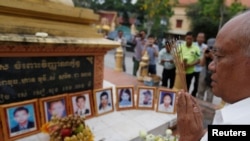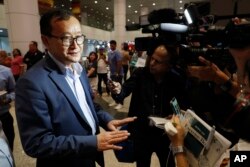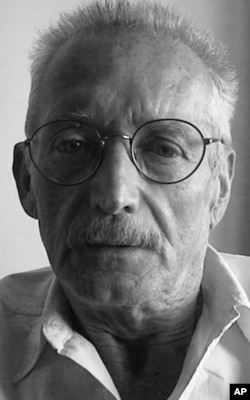A French judge has ordered two former bodyguards of Cambodia's Prime Minister Hun Sen to stand trial for their role in a bloody grenade attack 25 years ago in Phnom Penh.
Sixteen people died and more than 100 were injured by the strike on a peaceful protest.
Judge Sabine Kheris of the Court of Appeal of Paris has ruled that Huy Piseth and Hing Bun Heang, the former chief and deputy chief of Hun Sen's bodyguard unit, respectively, will be arraigned on the basis of the unanimous conclusion of a joint investigation by the U.S. Federal Bureau of Investigation (FBI), the United Nations and Human Rights Watch (HRW), according to a translation of the court document received by VOA Khmer.
Neither man is in custody. Huy Piseth is now a secretary of state for defense and Hing Bun Heang is deputy commander-in-chief of the army. Huy Piseth refused to comment on the judge's order when contacted by VOA Khmer. Hing Bun Heang called the ruling a violation of his rights and denied that he was at the protest where the attack occurred.
"Issuing an indictment at will like this would harm people," said Hing Bun Heang. "Making such charges for no reason is confusing."
The court is set to hold a trial next year with or without the defendants present, but no date has been set.
Filed by political opposition
The case was filed in November 2000 by Sam Rainsy, a French-Cambodian dual citizen who, as president of the Cambodia National Rescue Party (CNRP), is the de factor leader of Cambodia's national political opposition.
The two former bodyguards, now both generals in the Cambodian army, face charges of conspiracy to commit murder in the 1997 attack.
Rainsy told VOA the court's decision, which was filed on December 30, 2021, marks the "end of impunity" for the rich and powerful in a country where they're typically untouchable.
"This is a major development," Rainsy said in a late-February interview with VOA Khmer. "The culture of impunity has come to an end. Cambodians have suffered for decades because of this impunity."
It was 8:30 a.m. on a quiet Sunday on March 30, 1997, when more than 200 peaceful protesters led by Rainsy, then president of the Khmer Nation Party, rallied outside the National Assembly in Phnom Penh to demand judicial reform. Minutes later, four grenades were thrown into the protest, according to witnesses.
"They made an attempt on my life but failed and killed at least 16 people and wounded over 100 people," Rainsy said. "Therefore, the French court [had to work] to find justice for me."
Brad Adams, then a U.N. human rights officer in Cambodia, arrived at the scene just 10 minutes after the blasts.
"There were bodies lying everywhere, which was terrible," said Adams, now Asia director for Human Rights Watch, in a March 21 interview with VOA Khmer. "And the police were just standing there doing nothing. They wouldn't help anybody. I yelled at them, 'You've got to do something.' "
U.S. citizen Ron Abney of the International Republican Institute was injured while observing the protest. Abney was in Cambodia on a U.S.-government-sponsored democracy support mission, according to U.S. federal court documents.
Abney, who died in 2011, and Rainsy were among four named plaintiffs in a complaint filed in U.S. District Court for the Southern District of New York in 2005, during Hun Sen's visit to New York. Although U.S. officials served Hun Sen with a subpoena to appear, a plea deal was reached in 2006, which saw the plaintiffs withdraw the complaint.
The deal allowed Rainsy, self-exiled in France, to return to Cambodia, where some political prisoners were to be released.
"Hun Sen, in order to get rid of the problem, I assumed, privately entered into a settlement agreement with Sam Rainsy," said Morton Sklar, a lawyer for the plaintiffs. "And he essentially gave in to all the major political issues that were on the table at that time."
Sklar is satisfied with how the French case has moved forward.
"It's an indication that the international community is not going to let Hun Sen's abuses go unanswered," Sklar said. "There will be a response. There will be consequences."
The court documents said that Huy Piseth received an order from Hun Sen to attack the protest, according to the indictment.
"This is the most important case brought against people close to Hun Sen that implicates Hun Sen himself in a foreign court," said Adams of HRW. "The documents said that Hun Sen would be indicted if he were not in office."
Adams hopes to get a Red Notice from Interpol and a European arrest warrant under European Union rule for the two generals. According to Interpol, a Red Notice "is a request to law enforcement worldwide to locate and provisionally arrest a person pending extradition, surrender or similar legal action."
"This is a very well-documented attack," said Adams, who in 2015 provided French authorities with documents on the attack from the FBI investigation, media coverage, the U.N., HRW and U.S. congressional staff during an interview by a French judicial investigator.
"There's really no doubt about what happened, and the most important thing was that Hun Sen's bodyguards were deployed in the park in the event of the grenade attack," Adams said. "They allowed the people who threw the grenades to run through their line and then they threatened to kill people who were chasing after them."










